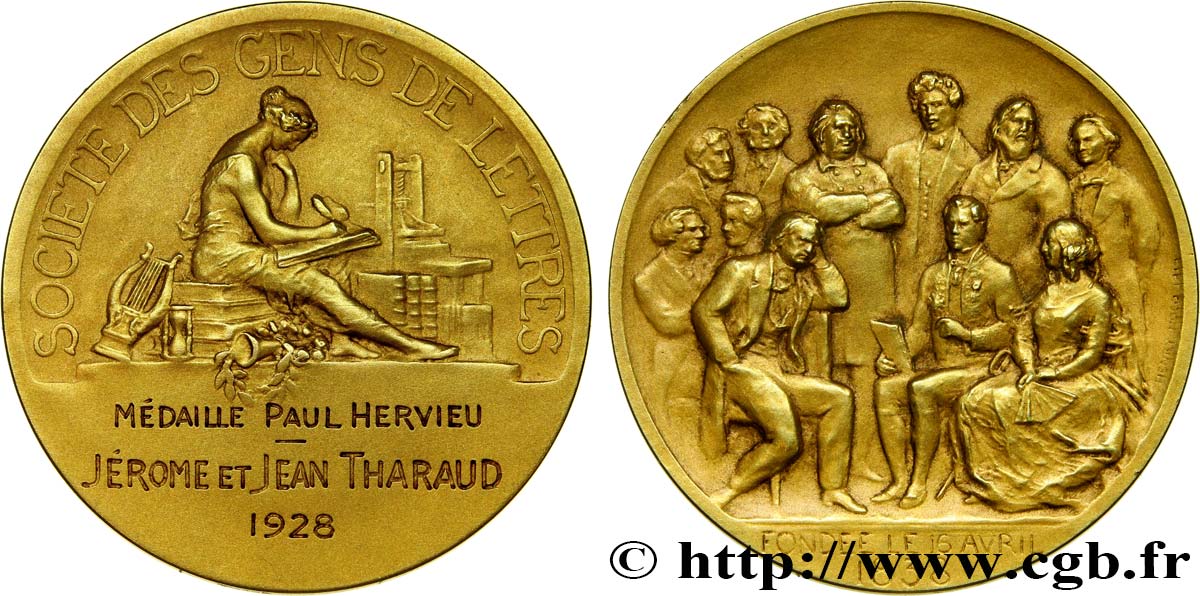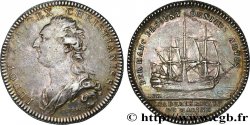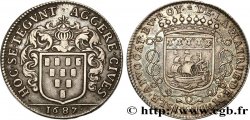Live auction - fme_438631 - III REPUBLIC Médaille Paul Hervieu décernée par la Société des gens de lettres
You must signin and be an approved bidder to bid, LOGIN TO BID. Accounts are subject to approval and the approval process takes place within 48 hours. Do not wait until the day a sale closes to register. Clicking on "BID" constitutes acceptance of the terms of use of cgb.fr private live auctions.
Bids must be placed in whole Euro amounts only. The sale will start closing at the time stated on the item description; any bids received at the site after the closing time will not be executed. Transmission times may vary and bids could be rejected if you wait until the last second. For further information check the Live auction FAQ
All winning bids are subject to a 18% buyer’s fee.
All winning bids are subject to a 18% buyer’s fee.
| Estimate : | 1 200 € |
| Price : | 655 € |
| Maximum bid : | 655 € |
| End of the sale : | 30 January 2018 16:58:20 |
| bidders : | 2 bidders |
Type : Médaille Paul Hervieu décernée par la Société des gens de lettres
Date: 1928
Mint name / Town : 75 - Paris
Metal : gold
Diameter : 35,5 mm
Orientation dies : 12 h.
Engraver NOCQ Henry (1869-1942)
Weight : 25,95 g.
Edge : lisse + corne 3 OR
Rarity : R3
Coments on the condition:
Superbe et rare médaille avec une fine patine de collection
Obverse
Obverse legend : SOCIÉTÉ DES GENS DE LETTRE // MÉDAILLE PAUL HERVIEU / JÉROME ET JEAN THARAUD / 1928.
Obverse description : Allégorie de la Littérature assise à droite sur des livres, écrivant sur ses genoux ; derrière une presse et à ses pieds une lyre, un sablier, une coupe, des lauriers et des reliures.
Reverse
Reverse legend : FONDÉE LE 16 AVRIL / 1838.
Reverse description : Groupe de 11 hommes et femmes à l’origine de la fondation de la Société des gens de Lettres.
Commentary
Henry Nocq, né Marie Eugène Henri Auguste Nocq le 13 janvier 1868 et mort en 1944, est un sculpteur et graveur-médailleur français.
Paris, 30 janvier : La Société des Gens de Lettres a attribué le 30 janvier 1928, la médaille Paul Hervieu et le prix Pierre Corrard. Ce dernier prix, qui a été fondé par la veuve de l'écrivain Pierre Corrard, tué à la guerre. Dans l'intention de la donatrice il doit être attribué à une œuvre de jeunes présentant quelque nouveauté. Le comité s'est réunit sous la présidence de M Edouard Estaunie, et la vice présidence de M. Maurice Renard. Le prix Pierre Corrard est attribué à Mme Lucienne Favre, pour son livre "L’Homme derrière le mur". La médaille, Paul Hervieu est décernée aux frères Jérôme et Jean Tharaud pour l'ensemble de leurs œuvres.
Jérôme (1874-1953) et Jean Tharaud (1877-1952), son frère, sont nés à Saint-Junien dans la Haute-Vienne dans une région, le Limousin, à laquelle ils resteront attachés. Leurs prénoms de baptême sont Ernest et Charles, et c’est Péguy qui leur donne plus tard les prénoms de Jérôme et Jean.
Jérôme et Jean Tharaud vont pendant cinquante ans composer une œuvre à quatre mains, signant toujours de leurs deux prénoms. Le cadet se chargeait du premier jet, tandis que l’aîné, Jérôme, s'occupait de la mise au point du texte. Ils voyagent dans de nombreux pays, la Palestine, l’Iran, le Maroc, la Roumanie, et ramènent de leurs voyages la matière à reportages et à livres.
Le 1er décembre 1938, Jérôme Tharaud est élu au 31e fauteuil de l’Académie française en remplacement de Joseph Bédier. La candidature de Jérôme Tharaud a posé aux académiciens un cas de conscience : l’écrivain, en effet, n’était que « la moitié d’un couple d’auteurs » et ils ne pouvaient pas élire simultanément les deux. Jean Tharaud y fut élu à son tour en 1946..
Henry Nocq, born Marie Eugène Henri Auguste Nocq on January 13, 1868 and died in 1944, was a French sculptor and engraver-medalist.
Paris, January 30: The Société des Gens de Lettres awarded the Paul Hervieu Medal and the Pierre Corrard Prize on January 30, 1928.. This latter prize, which was founded by the widow of the writer Pierre Corrard, killed in the war. According to the donor's intention, it should be attributed to a work by young people presenting some novelty.. The committee met under the chairmanship of Mr. Edouard Estaunie, and the vice-chairmanship of Mr.. Maurice Renard. The Pierre Corrard Prize is awarded to Ms. Lucienne Favre, for her book \\\"The Man Behind the Wall\\\". The Paul Hervieu medal is awarded to the brothers Jérôme and Jean Tharaud for their entire body of work..
Jérôme (1874-1953) and Jean Tharaud (1877-1952), his brother, were born in Saint-Junien in Haute-Vienne in a region, Limousin, to which they remained attached. Their first names were Ernest and Charles, and it was Péguy who later gave them the first names Jérôme and Jean..
Jérôme and Jean Tharaud spent fifty years composing a four-handed work, always signing with their two first names.. The younger brother was in charge of the first draft, while the elder, Jérôme, took care of finalizing the text.. They travel to many countries, Palestine, Iran, Morocco, Romania, and bring back from their travels material for reports and books..
On December 1, 1938, Jérôme Tharaud was elected to the 31st seat of the Académie française, replacing Joseph Bédier.. Jérôme Tharaud's candidacy posed a dilemma for the academics: the writer was, in fact, only \\\"one half of a couple of authors\\\" and they could not elect both simultaneously.. Jean Tharaud was elected in turn in 1946.
Paris, 30 janvier : La Société des Gens de Lettres a attribué le 30 janvier 1928, la médaille Paul Hervieu et le prix Pierre Corrard. Ce dernier prix, qui a été fondé par la veuve de l'écrivain Pierre Corrard, tué à la guerre. Dans l'intention de la donatrice il doit être attribué à une œuvre de jeunes présentant quelque nouveauté. Le comité s'est réunit sous la présidence de M Edouard Estaunie, et la vice présidence de M. Maurice Renard. Le prix Pierre Corrard est attribué à Mme Lucienne Favre, pour son livre "L’Homme derrière le mur". La médaille, Paul Hervieu est décernée aux frères Jérôme et Jean Tharaud pour l'ensemble de leurs œuvres.
Jérôme (1874-1953) et Jean Tharaud (1877-1952), son frère, sont nés à Saint-Junien dans la Haute-Vienne dans une région, le Limousin, à laquelle ils resteront attachés. Leurs prénoms de baptême sont Ernest et Charles, et c’est Péguy qui leur donne plus tard les prénoms de Jérôme et Jean.
Jérôme et Jean Tharaud vont pendant cinquante ans composer une œuvre à quatre mains, signant toujours de leurs deux prénoms. Le cadet se chargeait du premier jet, tandis que l’aîné, Jérôme, s'occupait de la mise au point du texte. Ils voyagent dans de nombreux pays, la Palestine, l’Iran, le Maroc, la Roumanie, et ramènent de leurs voyages la matière à reportages et à livres.
Le 1er décembre 1938, Jérôme Tharaud est élu au 31e fauteuil de l’Académie française en remplacement de Joseph Bédier. La candidature de Jérôme Tharaud a posé aux académiciens un cas de conscience : l’écrivain, en effet, n’était que « la moitié d’un couple d’auteurs » et ils ne pouvaient pas élire simultanément les deux. Jean Tharaud y fut élu à son tour en 1946..
Henry Nocq, born Marie Eugène Henri Auguste Nocq on January 13, 1868 and died in 1944, was a French sculptor and engraver-medalist.
Paris, January 30: The Société des Gens de Lettres awarded the Paul Hervieu Medal and the Pierre Corrard Prize on January 30, 1928.. This latter prize, which was founded by the widow of the writer Pierre Corrard, killed in the war. According to the donor's intention, it should be attributed to a work by young people presenting some novelty.. The committee met under the chairmanship of Mr. Edouard Estaunie, and the vice-chairmanship of Mr.. Maurice Renard. The Pierre Corrard Prize is awarded to Ms. Lucienne Favre, for her book \\\"The Man Behind the Wall\\\". The Paul Hervieu medal is awarded to the brothers Jérôme and Jean Tharaud for their entire body of work..
Jérôme (1874-1953) and Jean Tharaud (1877-1952), his brother, were born in Saint-Junien in Haute-Vienne in a region, Limousin, to which they remained attached. Their first names were Ernest and Charles, and it was Péguy who later gave them the first names Jérôme and Jean..
Jérôme and Jean Tharaud spent fifty years composing a four-handed work, always signing with their two first names.. The younger brother was in charge of the first draft, while the elder, Jérôme, took care of finalizing the text.. They travel to many countries, Palestine, Iran, Morocco, Romania, and bring back from their travels material for reports and books..
On December 1, 1938, Jérôme Tharaud was elected to the 31st seat of the Académie française, replacing Joseph Bédier.. Jérôme Tharaud's candidacy posed a dilemma for the academics: the writer was, in fact, only \\\"one half of a couple of authors\\\" and they could not elect both simultaneously.. Jean Tharaud was elected in turn in 1946.








 Report a mistake
Report a mistake Print the page
Print the page Share my selection
Share my selection Ask a question
Ask a question Consign / sell
Consign / sell
 Full data
Full data















